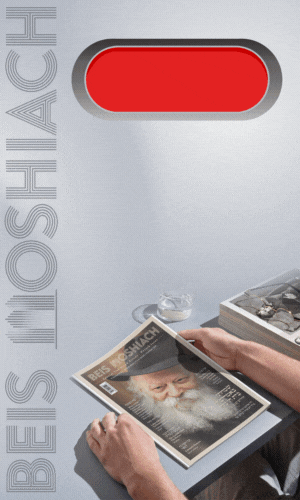The Historical and Psychological Meaning of Ezekiel’s Vision
By Rabbi YY Jacobson, TheYeshiva.net: The Historical and Psychological Meaning of Ezekiel’s Vision • The haftorah of this coming Shabbos, Chol Hamoed Pesach, is one of the most poignant prophecies in the Tanach—the first fourteen verses of the 37th chapter of Ezekiel, known as the vision of “the dry bones.” • Full Article
By Rabbi YY Jacobson, TheYeshiva.net
Ezekiel’s Vision
A wind lifts Ezekiel and carries him to a valley. The valley is filled with bones, many bones, very dry bones. G-d asks Ezekiel, “Son of man, can these bones come to life?” Ezekiel responds: “O G-d, only You know.”
G-d then commands Ezekiel to speak to the bones: “O dry bones! Hear the word of G-d.” He instructs Ezekiel to tell the bones that a spirit will enter them, and they will come back to life; flesh, sinews and skin will grow back on the bones, and they will once again live.
Ezekiel speaks to the dry bones. “And there arose a noise as I prophesized, behold a commotion, as the bones were coming together, bone to bone. And I looked and sinews were upon them, and flesh came upon them, and skin covered them from above. But there was still no spirit in them.”
G-d says to Ezekiel, “Prophesize, son of man, and say to the spirit: So says G-d, from four sides come a spirit, and breathe life into these slain, that they may live.”
Ezekiel obeys again, and the spirit came into the lifeless bodies. They came to life and stood on their feet, “a very great and large army of people.”
“And G-d said to me, son of man, these bones are the whole house of Israel. They say, our bones are dried up, our hope is lost, we are cut off. Therefore, prophesize and tell them, thus says G-d, I will open your graves and lift you out of the graves, my people, and I will bring you to the land of Israel… I will put my spirit into you, and you shall live, and I will set you on your land…”
Why did the sages institute that we read this vision on the Shabbos in middle of the Passover?[1] What’s the connection with Pesach?
Also, what is the symbolism behind this haunting vision? The Talmud cites two opinions as to whether this vision was a metaphor, an allegory, or an actual event.[2] What is clear, though, is that “these bones are the whole house of Israel,” as G-d tells Ezekiel. This vision, in other words, captures the Jewish story.
Let us explore two possible perspectives, from a historical and psychological vantage point.
Mounds of Dry Bones
It is hard to escape the notion that Ezekiel’s prophecy—uttered during the 6th century BCE, following the destruction of the First Temple and the Jewish exile to Babylonia—is so relevant in our own age.
Almost eight decades ago, six million of our brothers and sisters were reduced to ashes mixed with tiny particles of dry bones. Many of the Nazi extermination camps were filled with mounds of dry bones. From the establishment of Auschwitz by the Nazis in January 1940, until its liberation five years later, on January 27, 1945, over 1 million people, including 900,000 of Europe’s Jews, were murdered there in the largest mass-murder in history.
Across the soil of Europe, Jewish bones were swallowed up by the earth, leaving no trace of millions of glorious lives: Babi Yar—40,000, Treblinka—800,000, Chelmno—150,000, Majdanek—60,000, Sobibor—250,000, Buchenwald—liberated by the US on April 4, 1945—56,000, Bergen Belzen—100,00, Belzec—600,000, Mauthausen—320,000, Dachau—35,000, and the numerous mass graves in the forests of Eastern Europe where Jewish children and their parents were gunned down in a Holocaust of bullets.
Can These Bones Live?
Everyone asked the same question, paraphrasing G-d’s words to Ezekiel: “Can these bones live?” Can there be a future for a people singled out by the Third Reich for systematic destruction and left by the rest of the civilized world to hang from the German gallows? Does this nation still have a place in this cursed world, which barely uttered a protest as one-and-a-half million children were gassed, many of them infants in the hands of their mothers?
Where is the quill that can articulate what our people felt like as 1000 years of life in Eastern Europe came to a brutal end, as hundreds of communities were plucked out in just a few years, and a nation full of life and passions was decimated, while even the survivors felt like walking skeletons?
Rudolf Hess, the commandant of Auschwitz, was tried at Nuremberg in 1946. During the trial, he said that Eichmann and Hitler were convinced that if they could succeed in destroying the biological basis of Jewry in the East by complete extermination, then Jewry as a whole would never recover from the blow, and after three millennia, the Jewish nation would finally come to an end.
How about the millions living in America? Hess was asked. “The assimilated Jews of the west,” Hess said, “would be in no position and would have no desire to make good this enormous loss of blood and there would therefore be no future generation worth mentioning.”
Statistically, Eichman and Hitler were right. After such a blow, despair and assimilation would have been the natural route. What they did not realize was that the Jewish people were governed by different rules—by Ezekiel’s vision—in which the dry bones contained the secret of rebirth.
Watching the School Buses
I once read a story that captured this truth.
Every morning, he would stand outdoors for 30 minutes watching the school buses in the Boro Park section of Brooklyn pick up the children and take them to school.
Boro Park is home to a few hundred thousand Jews of every Chassidic group and denomination. There are hundreds of Jewish schools in that neighborhood, and there is no shortage of school buses picking up different children. This man stood gazing at these buses every morning.
The onlookers thought he was an old, lonely, and bored man, perhaps half senile, who had nothing better to do but stand outside and watch the traffic. This was his recreation. But one day someone approached him and asked him why he did this daily.
This was his response: I was in Auschwitz. I lost my children there. I watched thousands of transports of Jewish children arrive there. Within the hour, their young, fragile, and adorable bodies were shoved into ovens. I watched it all. I saw it all, and I could say nothing. I could do nothing, besides swear that one day I would take revenge.
Now I take my revenge, every single morning. As I stand outside and watch hundreds of children, with their yarmulkes on their heads, their sidelocks rolling down their cheeks, running on to the buses to take them to yeshiva—I can celebrate once again. Just to hear the sounds of children laughing and to watch their glowing faces as their mothers kiss them goodbye, is, for me, the greatest victory of good over evil, of purity over despicable profanity.
October 7th, 2023
Sadly, six months ago, the Jewish world again watched in horror how so many of our brothers and sisters were burned, slain, and kidnapped. Many of their bodies were burned so badly, that, in some cases, there were only some charred bones left.
The pain is visceral, and the horrors are unfathomable.
Though we do not understand, we too take comfort in the vision of Ezekial, that we only see a little part of the larger story of life and history. Each one of these dry bones will yet return to life, that good will prevail over evil, and that Israel shall live forever.
The Fire Lives On
There is also the vision of “dry bones” in our own personal lives. At some point in our lives, each of us dreamed of grand dreams, yearned to scale great mountains, and aspired to accomplish sublime goals. We pined to live and love to the fullest, to maximize our potential, to make a real impact on people’s lives, to be ambassadors of love, light, and hope, to challenge ourselves in deep ways.
But as life moves on, sometimes “reality” sets in, the stress of daily life overwhelms us, and the pain and agony accompanying our journeys get the better of us. Our idealism is dulled, if not slain, our ambitions repressed, and our vibrancy snuffed out, as we resign to a life of quiet desperation.
Some of us have been hurt so badly, that parts of our brains shut down. Creativity, curiosity, caring, compassion, confidence, calmness, clarity, and courage turned into a daily struggle for survival. We look in the mirror, and we see emaciated bones, and an emaciated spirit. We suffer from anxiety, confusion, and dissociation. Depression replaced trust; fear replaced passion. We feel lifeless and numb.
Comes Ezekiel and tells us in the name of our loving Creator: “Speak to your dry bones! Tell them, “O, my dear dry bones, can you hear the world of G-d?” No dream ever dies completely; no fire is totally extinguished; no passion can fade completely. Within the dry bones, there is still an invisible, potential life force. There are lurking embers. No life experience and no rotten perpetrator can truly snuff out the authentic self, which is a derivative of the consciousness of infinity. The core self is untethered and unburdened. Speak to it, reach out to it, believe in it, and your dry bones will return to life.
Show Me Your Beautiful Face
This all may be one reason why this haftorah is read on Passover.
The Song of Songs, read by many communities after the Passover seder and on Shabbos Chol Hamoed of Pesach, movingly describes the spring season when we celebrate Passover:[3]
עָנָה דוֹדִי, וְאָמַר לִי: קוּמִי לָךְ רַעְיָתִי יָפָתִי, וּלְכִי-לָךְ. כִּי-הִנֵּה הַסְּתָו, עָבָר; הַגֶּשֶׁם, חָלַף הָלַךְ לוֹ. הַנִּצָּנִים נִרְאוּ בָאָרֶץ, עֵת הַזָּמִיר הִגִּיעַ; וְקוֹל הַתּוֹר, נִשְׁמַע בְּאַרְצֵנוּ. הַתְּאֵנָה חָנְטָה פַגֶּיהָ, וְהַגְּפָנִים סְמָדַר נָתְנוּ רֵיחַ; קוּמִי לָךְ רַעְיָתִי יָפָתִי, וּלְכִי-לָךְ. יוֹנָתִי בְּחַגְוֵי הַסֶּלַע, בְּסֵתֶר הַמַּדְרֵגָה, הַרְאִינִי אֶת-מַרְאַיִךְ, הַשְׁמִיעִנִי אֶת-קוֹלֵךְ: כִּי-קוֹלֵךְ עָרֵב, וּמַרְאֵיךְ נָאוֶה.
My beloved spoke, and said to me: ‘Rise up, my love, my beautiful one, and move on. For the winter has past, the rain is over and gone; the flowers appeared on the earth; the time of singing has come, and the voice of the dove is heard in our land; the fig tree put forth her green figs, and the vines in blossom have produced their fragrance. Arise, my love, my beautiful one, and move on. My dove is hidden in the clefts of the rock, in the covert of the cliff, let me see your countenance, let me hear your voice; for your voice is sweet, and your countenance is comely.
Does this not describe the story of so many? Our passion, our love, and our ecstasy have become eclipsed in the clefts of the hard rock; our voices have been silenced, maybe from a very young age; our faces have been disguised, perhaps because of the pain and disillusionment we experienced many years ago. We are parched and dry.
Comes Passover and tells us that the long winter has past—the rain, the cold, and the frostbite are now over. The physical change of the season beacons us to change our psychological seasoning as well. The flowers have begun to blossom; the time of singing has come, and the voice of the dove is heard in our land. “Arise, my love, my beautiful one… Show me your face, let me hear your voice,” G-d says. Come out of your hibernation, from the clefts of the rocks. I want to see you, and I want to hear you. Your light and love are too precious to be eclipsed any longer. Pesach is the holiday of renewal, from slavery to liberation, from oppression to freedom, from winter’s melancholy to spring renewal. From dry bones, let life emerge.
Come out, my love, let me see you. “Let me see your countenance, let me hear your voice; for your voice is sweet, and your countenance is comely.” I have never given up on you; please— G-d begs—do not give up on yourself. Do not allow abuse or neglect in any form to block your light forever.
Jewish Renewal
Finally, there is one more vital message embodied in the prophecy of the dry bones for the Jewish world today—and this is an insight I heard from the Lubavitcher Rebbe during his public address on the Shabbos after Passover, 24 Nissan, 5746, May 3, 1986.
I will never forget the passion with which the Rebbe repeated these words from Ezekiel. It felt like the walls of “770” were shaking as the Rebbe thundered: “Dry bones! Hear the word of G-d.” in my imagination, I can still hear the Rebbe, in his sincerity and passion, communicating this prophecy of Ezekiel, and it still ignites hope in my own wounded heart.
We sometimes look around us, the Rebbe said, and see an abundance of “dry bones.” As we look at the world around us, and the Jewish world, it seems that so many of us are saturated with emotional toxicity. Lies, abuse, cover-ups, corruption, folly, superficiality, and stupidity, have penetrated our communities in ways that most of us do not even realize. Our innocent children displaying despair are simply showing us what is happening beneath the surface.
On a moral and spiritual level, so many of our beloved brothers and sisters seem to have forgotten the melody of intimacy, of oneness, of Divine love, and connectivity. And so many of our people are completely apathetic or even self-hating. It is easy to despair, to become cynical, and to retreat.
Comes a wind that forcibly drags Ezekiel from his elevated spiritual cocoon into a valley filled with dry bones. Reach out to them, G-d instructs him, and say to them:
הָעֲצָמוֹת הַיְבֵשׁוֹת שִׁמְעוּ דְּבַר ה’!
O dry bones, hear the word of G-d!
Do not give up on these dry bones. You never know the power contained in their souls; you will never know the embers lurking beneath the cold surface. Share with them the hope, the promise of G-d that they are capable of rejuvenation, or re-Jew-venation, and the miracle will happen.
Intriguingly and unusually, throughout this prophecy, G-d refers to Ezekiel as “Ben Adam, son of man.” G-d is telling him: Ezekiel! If you are only a human being, an Adam, if you have a simple human heart, and even if you are only “the son of a human being,” do not let these dry bones remain forsaken and forgotten. Believe in their future, in their destiny, and in their potential, and they will shock you by the depth of life they are capable of absorbing.
And do not think you can only impact one person at a time, one lone gracious soul. No! G-d empowered the prophet to resurrect a nation of bones. We can revolutionize the world! Even if it sometimes seems many of us have become a nation of sleepwalkers, we can bring the word of G-d to ourselves and to an entire generation of dry bones. We can change the paradigms of our culture; we can transform the foundations of our society. We can introduce life instead of death, truth instead of falsehood.
And if we do so, we too will see the miracle occur before our own eyes: the bones will return to life.
~~~~~
[1] See Megilah 31a. Rashi (Megilah ibid.) explains it based on the opinion in Talmud (Sanhedrin 92b) that the dry bones were the children of Ephraim who left Egypt prematurely (30 years before the rest of the Hebrews), and were slain by the Philistines, so their resurrection is also remembered during Passover when we celebrate the Egyptian Exodus. Others explain this custom based on the tradition that the resurrection of the dead will occur in the month of Nissan (Tur Orach Chaim section 490, in the name of Rav Hei Gaon. Quoted in Shulchan Aruch HaRav Orach Chaim 460:16. Cf. references noted there.)
[2] See Talmud Sanhedrim 92b where an argument is cited if the story is a metaphor or a description of reality. Cf. Talmud ibid. where he quotes five opinions on who were these dry bones which brought back to life. Interestingly, it seems, the five opinions represent five categories of Jews which capture the entire spectrum of Jewry. This is beyond the scope of this essay. Cf. Reshimos vol. 7
124
Join ChabadInfo's News Roundup and alerts for the HOTTEST Chabad news and updates!












































